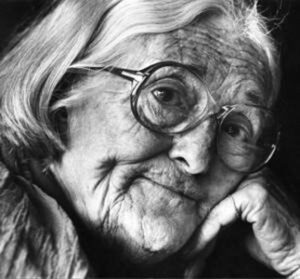Meridel LeSueur Biography
“The people are a story that never ends,
A river that winds and falls and gleams erect in many dawns;
Lost in deep gulleys, it turns to dust, rushes in the spring freshet,
Emerges to the sea. The people are a story that is a long incessant
Coming alive from the earth in better wheat, Percherons,
Babies, and engines, persistent and inevitable.
The people always know that some of the grain will be good,
Some of the crop will be saved, some will return and
Bear the strength of the kernel, that from the bloodiest year
Some survive to outfox the frost.”
Meridel LeSueur, North Star Country (1945)
Meridel LeSueur’s poetry, short stories, and novels are a beloved part of the cultural and political fabric of our times. She was one of the great women literary and communal voices of the twentieth century, which her long life spanned. Meridel was born on February 22, 1900 in Murray, Iowa, and died in Hudson, Wisconsin on November 14, 1996. Meridel wrote, “I was born at the beginning of the swiftest and bloodiest century at Murray, Iowa in a white square puritan house in the corn belt…” She described her own roots as springing from “preachers, abolitionists, agrarians, radical lawyers on the Lincoln, Illinois, circuit. Dissenters and democrats and radicals through five generations.” As a child she lived in Iowa, Kansas, Oklahoma, Texas and Minnesota. She believed in giving voice to people’s struggles. She said she learned early to write down what they were saying, hiding behind water troughs in the streets, under tables at home—listening. Listening to the tales of the lives of the people, her writings were grounded in these grassroots, salt-of-the-earth stories and experiences of working people, of the poor, the disenfranchised, the dispossessed. She strove to make history a living, moving entity in our lives. She once said that words should heat you, they should make you rise up out of your chair and move!
She led a colorful and vibrant life. As a young woman, she studied physical culture and drama in Chicago and New York City and she plied her talent in the silent movies in California as a stunt woman. As a young activist she lived for a time in Emma Goldman’s commune in New York City. Throughout her life she wrote from and was part of the great social and political movements of her time. Her writing encompasses proletarian novels, widely anthologized short stories, partisan reportage, children’s books, personal journals, and powerful feminist poetry. Her early works, in addition to profound working class consciousness, are also focused on the struggles of women, and particularly poor women, those sterilized without their consent in so-called mental hospitals, those on the breadlines, those whose lives and oppression more traditional leftwing ideologues did not comprehend. Her children’s books found heroes and sheroes in US history, and are especially noteworthy for their non-racist depiction of Native American peoples and cultures. Meridel believed her writing could be a bridge making connections across many different cultures. The diverse communities that identify with and celebrate her work are a moving testament to the depth and power of her writing.
Her books and poetry come from a great radical writer, a worker in words, a poet and feminist far ahead of—yet totally in tune with—her times. Her timeless writing brings us the voice of our grandmother Meridel—a voice of revolutionary wisdom and indomitable resistance. As she said, “survival is a form of resistance.” Meridel saw Halley’s Comet twice, once when she was 10 years old and again when she was 85—we are certain that the impact of her work will be felt the next time Halley’s comes around….and the next… and the next….seven generations and more from today! Meridel’s life and writings testify to the profoundly democratic idea that positive social change always bubbles up—and sometimes erupts—from below. With Marx she would agree that to be radical means to go to the root of things—and at the root of things are the people themselves. She would enthusiastically greet the new movements rising today. It is our fervent hope that all of Meridel’s writings survive to “outfox the frost.”
